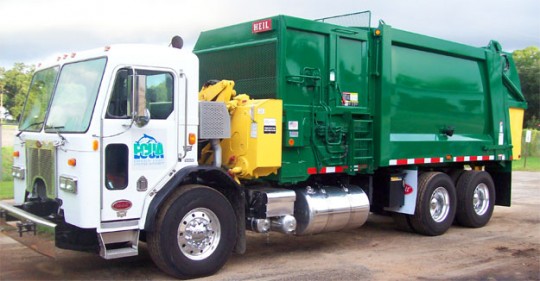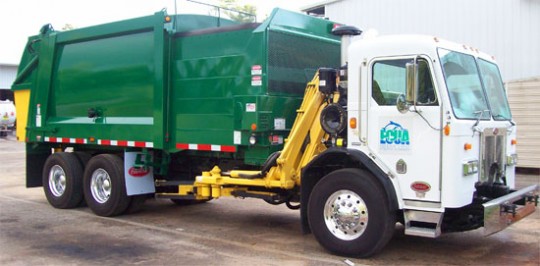ECUA’s New Green Machine Hits The Streets
August 30, 2010
The Emerald Coast Utilities Authorities is introducing green technology with a new big green machine hitting the streets. It is a Peterbilt Model 320 HLA (Hydraulic Launch Assist) Hybrid garbage truck.
The Model 320 HLA is considerably quieter in its daily stop, pick-up, and go operations. ECUA sanitation and recycling vehicles stop and go an average of 1,200 times during a normal daily refuse route. The new vehicle delivers a significant 30 percent reduction in emissions and a 30 percent improvement in fuel consumption.
The HLA hybrid reduces brake-related maintenance costs by 50 percent, doubling the brake life expectancy while using biodegradable hydraulic oil — which is friendlier to the environment.
“The HLA technology works by recovering up to 75% of energy lost by the vehicle’s brakes in the form of pressurized hydraulic fluid. The fuel is stored until the driver next accelerates the vehicle, which reduces fuel consumption and wear on the engine. This is an ideal environmental option for refuse pick-up applications,” ECUA Director of Sanitation Randy Rudd said.
During the first year, ECUA will operate a single vehicle while gathering performance and maintenance data. The Authority will then use this data to compare the hydraulic hybrid system against other hybrid alternatives, and compressed natural gas powered vehicles. This will then allow the Authority to evaluate the costs and operational issues before additional units are procured.
The vehicle will be on the highways in North Escambia on regular Tuesday routes and will be rotated on all other routes across the county.
The hybrid truck, which was a demo model with 4,600 miles, cost $174,500. The cost of a new model is $228,000, plus an additional $30,000 for the hydraulic hybrid conversion kit.
The plain green side of the vehicle won’t be solid green very long — ECUA is currently planning a contest to allow the residents of Escambia County a chance to create a design for the side of the truck.
Submitted photos for NorthEscambia.com, click to enlarge.
Comments
13 Responses to “ECUA’s New Green Machine Hits The Streets”





chuckle
De rien, ca me fait plaisir.
merci beau coup
David,
Expected savngs on fuel is 30%. The life expectancy of the vehicle is 8-10 years, no different than a non-hybrid vehicle. The benefit comes from the savings on fuel consumption and maintenance costs on brakes (50% reduction), and the reduction in emiisions, which benefits the environment. These vehicles typically get 300,000 miles.
Nathalie, learning more myself
Yep, thanks. So any more will cost us $258,000 each.
More questions: expected life in years and miles, anticipated savings in fuel cost?
David gaining enlightenment
Response to David Huie Green:
This was a demo model tghat ECUA was able to purchase for $174,500. The regular cost of the vehicle is $228,000 and $30,000 is added to convert it to the hybrid system. So, brand new, the vehicle would have cost the Authority $258,000. No hidden costs.
Hope that helps.
REGARDING:
“The cost of the vehicle was $174,500. The usual cost of a sanitation vehicle of this kind is $228,000, plus $30,000 for the hybrid conversion.”
“A sanitation vehicle of this kind”? so it’s cheaper than its kind and may be cheaper over the long run, at least it sounds like it might.
Does this mean the run of the mill vehicle costs $228,000 and upgrading the run of the mill vehicles to be what this vehicle alread is would normally add $30,000 to the cost? Are there any hidden costs or elevated costs down the road?
David not skeptical, just curious
In reply to Kent-
Yes, this has been a challenge. We have worked with the truck manufactrurers to design and install a baffle on the trucks, meant to contain any loose items. This helps but is not the complete solution.
In the end, the best thing to do is to remember to bag small, lightweight items such as plastic bags, shredded paper, packing peanuts. Although the plastic grocery bags themselves are not recyclable, we encourage their use in firmly containing other recyclables, which will be removed from the bag at the recycling center. We appreciate all our customers’ attention to this detail as is does make a difference to all in our community.
I hope these are designed to keep the trash from blowing out the top. It’s funny how they collect the recyclables to improve the environment and then spread the plastic bags along the highways.
William, you beat me to it! Thanks
The cost of the vehicle was $174,500. The usual cost of a sanitation vehicle of this kind is $228,000, plus $30,000 for the hybrid conversion.
We were able to purchase this demo vehicle with 4600 miles on it, to accommodate our fleet’s growing needs due to the increasing popularity of our recycling program. We now have approximately 52% of our customers participating in the recycling program, with about 250 customers signing up each week.
>I noticed there was no mention of the price of this vehicle in the article.
Information now added to the story:
The hybrid truck, which was a demo model with 4,600 miles, cost $174,500. The cost of a new model is $228,000, plus an additional $30,000 for the hydraulic hybrid conversion kit.
I noticed there was no mention of the price of this vehicle in the article.
JM